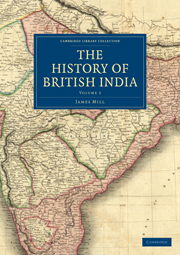Summary
War with the French, instead of being, as formerly, the most alarming to the English of all sources of danger in India, now held a very inferior station among the great objects which occupied their attention. In the beginning of July, 1778, intelligence was received in Bengal, which, though somewhat premature, was acted upon as certain, that war had commenced between England and France. Without waiting for a formal notification of this event, which might be only waiting till the French had made themselves strong, it was resolved by a stroke, decisive in their present defenceless situation, to take possession of the whole of the French settlements in India. With regard to minor places, the attempt was easy; and Chandernagore, with the factories at Masulipatam and Carical, surrendered without resistance: Pondicherry was the object of importance; and it was resolved to lose no time in taking measures for its reduction. Instructions were sent to Madras, and reached it with unusual expedition. Major-General Sir Hector Munro, who commanded the Madras army, took post on an elevated ground, called the Red Hills, distant about a league from Pondicherry, on the 8th of August; and on the 9th summoned the place to surrender. But his preparations were still so backward, that it was the 21st of August before he took possession of the bound hedge, within cannon shot of the town; and ground was not broken till the 6th of September. It was broken in two places, with a view to carry on attacks upon both sides of the town at once.
- Type
- Chapter
- Information
- The History of British India , pp. 476 - 552Publisher: Cambridge University PressPrint publication year: 2010First published in: 1817



